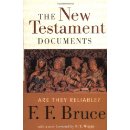I've been reading a lot more lately, specifically using the Kindle app. I just finished reading The New Testament Documents: Are They Reliable?
"For the Christian gospel is
not primarily a code of ethics or a metaphysical system; it is first and
foremost good news, and as such it was proclaimed by its earliest
preachers."
"No matter how we classify the gospel material, we never arrive at a non-supernatural Jesus."
"The gospel as preached in those early days
emphasized what Jesus did rather than what He said. The proclamation
which led to the conversion of Jews and Gentiles was the good news that
by His death and triumph He had procured remission of sins and opened
the kingdom of heaven to all believers."
"In his Argument to the Gospel of John, the great
Reformer John Calvin says: `I am in the habit of saying that this
Gospel is the key which opens the door to the understanding of the
others.' His opinion has been endorsed by Christian thinkers of many
ages, who have found in this Gospel depths of spiritual truth unreached
in any other New Testament writing."
"The members of the Christian Industrial League,
an organization which carries on a gospel witness among the tough
characters of Skidrow, in the heart of Chicago's `Loop' area, say `that
in their work they have found that St. John's Gospel is the best for
dealing with these tough, hard men. Its straight, unequivocal words
about sin and salvation somehow go home and carry conviction to the most
abandoned, while its direct invitation wins a response that nothing
else does.'"
"The same victorious power that raised Jesus from
the dead is the power which operates in His followers, achieving in
their lives triumph over the dominion of evil. Properly to appreciate
the power of God in the resurrection of Christ, one must appreciate it
in one's own experience. That is why Paul prayed that he might thus know
Christ, and the power of his resurrection"
"Luke is a historian of the first rank; not
merely are his statements of fact trustworthy; he is possessed of the
true historic sense; he fixes his mind on the idea and plan that
rules in the evolution of history, and proportions the scale of his
treatment to the importance of each incident. He seizes the important
and critical events and shows their true nature at greater length, while
he touches lightly or omits entirely much that was valueless for his
purpose. In short, this author should be placed along with the very
greatest of historians." - Bruce, quoting Sir William Ramsay
"One point is worth noting, however: apart from
Jewish and Christian writers, Tacitus is the one and only ancient author
to mention Pilate. It may surely be accounted one of the ironies of
history that the only mention Pilate receives from a Roman historian is
in connection with the part he played in the execution of Jesus!"
"The spirit of these early Christians ought to
animate their modern descendants. For by an acquaintance with the
relevant evidence they will not only be able to give to everyone who
asks them a reason for the hope that is in them,
but they themselves, like Theophilus, will thus know more accurately how
secure is the basis of the faith which they have been taught."

No comments:
Post a Comment